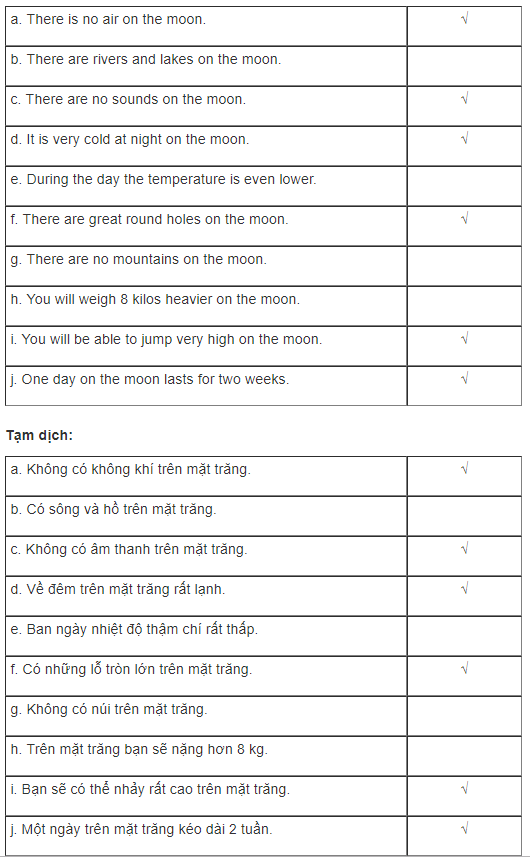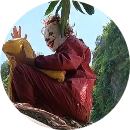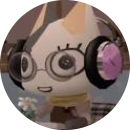
Những câu hỏi liên quan
IV. Read the following text and answer the questions by choosing the option A, B, C or D. Mercury is the smallest planet in our solar system. Its just a little bigger than Earths moon. It is the closest planet to the sun, but its actually not the hottest. Venus is hotter. Along with Venus, Earth, and Mars, Mercury is one of the rocky planets. It has a solid surface that is covered with craters. It has a thin atmosphere, and it doesnt have any moons. Mercury likes to keep things sim...
Đọc tiếp
IV. Read the following text and answer the questions by choosing the option A, B, C or D.
Mercury is the smallest planet in our solar system. It's just a little bigger than Earth's moon. It is the closest planet to the sun, but it's actually not the hottest. Venus is hotter.
Along with Venus, Earth, and Mars, Mercury is one of the rocky planets. It has a solid surface that is covered with craters. It has a thin atmosphere, and it doesn't have any moons. Mercury likes to keep things simple.
This small planet spins around slowly compared to Earth, so one day lasts a long time. Mercury takes 59 Earth days to make one full rotation. A year on Mercury goes by fast. Because it's the closest planet to the sun, it doesn't take very long to go all the way around. It completes one revolution around the sun in just 88 Earth days. If you lived on Mercury, you'd have a birthday every three month!
A day on Mercury is not like a day here on Earth. For us, the sun rises and sets each and every day. Because Mercury has a slow spin and short year, it takes a long time for the sun to rise and set there. Mercury only has one sunrise every 180 Earth days! Isn't that weird?
(Source: https://spaceplace.nasa.gov)
1. What does the passage mainly discuss?
A. Days on Mercury B. What Mercury is like
C. Sunrise on Mercury D. Length of a year on Mercury
2. According to the passage, Mercury _____________.
A. is the nearest to the Sun B. doesn't have atmosphere
C. the hottest planet D. has many moons
3. The word "It" in paragraph 2 refers to _____________.
A. Earth B. Mercury C. Venus D. Mars
4. The word "spins" in paragraph 3 can be best replaced by _____________.
A. comes B. arrives C. appears D. moves
5. It can be inferred from the passage that a year on Mercury _____________.
A. has 59 days B. much longer than that on Earth
C. has 88 days D. has only 180 days
6. How often does the sunrise on Mercury?
A. The same as on Earth. B. Every 3 months.
C. Every 180 days. D. Sun never sets.
Good evening. Welcome to our Science for Fun Program. This week, we’ve received a lot of questions asking about life on the moon. We’ve talked to some experts and this is what we’ve found out. There is no water or air on the moon. It is all silent because there is no air. Of course, there will be no music, no sounds. There are no rivers and no lakes. At night, it is very cold. The temperature goes down 1510C below zero. But during the day the temperature rises to 100 0C above zero.There are grea...
Đọc tiếp
Good evening. Welcome to our Science for Fun Program. This week, we’ve received a lot of questions asking about life on the moon. We’ve talked to some experts and this is what we’ve found out. There is no water or air on the moon. It is all silent because there is no air. Of course, there will be no music, no sounds. There are no rivers and no lakes. At night, it is very cold. The temperature goes down 1510C below zero. But during the day the temperature rises to 100 0C above zero.
There are great round holes on the moon. They look like big lakes. They are called craters. There are more than 30,000 craters on the moon. There are also high mountains. The highest mountains on the moon are about 26,000 feet or 8,000 meters high.
And here is something very interesting to know: on the moon you weigh one sixth of what you weigh on earth. If you weigh 50 kilos, on the moon you will weigh only a little more than 8 kilos. You will be able to jump very high, even higher than an Olympic Champion. You can take very long steps as well. And … may be you want won’t sleep very well because one day on the moon lasts for 2 weeks.
So, is there life on the moon? I’ll leave the question for you to answer yourself.
……16. There is no air on the moon.
……17. There are rivers and lakes on the moon.
……18. There are no sounds on the moon.
……19. It is very cold at night on the moon.
……20. During the day the temperature is even lower.
……21. There are great round holes on the moon.
……22. There are no mountains on the moon.
……23. You will weigh 8 kilos heavier on the moon.
……24. You will be able to jump very high on the moon.
……25. One day on the moon lasts for two weeks.
Fill in the blanks with What, When or Where1._________ is the name of the President of the United States of America?2. _________ month is the Chinese new year?3. _________did Neil Armstrong say when he first landed on the moon?4. _________did he first land?5. _________ did the Americans drop the atomic bomb on Hiroshima?6. _________is New York city?7. _________ is that called in English?8. _________are the Hawaiian Islands?9. _________are you doing this afternoon?
Đọc tiếp
Fill in the blanks with What, When or Where
1._________ is the name of the President of the United States of America?
2. _________ month is the Chinese new year?
3. _________did Neil Armstrong say when he first landed on the moon?
4. _________did he first land?
5. _________ did the Americans drop the atomic bomb on Hiroshima?
6. _________is New York city?
7. _________ is that called in English?
8. _________are the Hawaiian Islands?
9. _________are you doing this afternoon?
1.____What_____ is the name of the President of the United States of America?
2. ___What______ month is the Chinese new year?
3. ___What____did Neil Armstrong say when he first landed on the moon?
4. ____Where_____did he first land?
5. _____When____ did the Americans drop the atomic bomb on Hiroshima?
6. ____Where_____is New York city?
7. ____What_____ is that called in English?
8. ______Where___are the Hawaiian Islands?
9. ___What______are you doing this afternoon?
Đúng 8
Bình luận (3)
Fill in the blanks with What, When or Where1._________ is the name of the President of the United States of America?2. _________ month is the Chinese new year?3. _________did Neil Armstrong say when he first landed on the moon?4. _________did he first land?5. _________ did the Americans drop the atomic bomb on Hiroshima?6. _________is New York city?7. _________ is that called in English?8. _________are the Hawaiian Islands?9. _________are you doing this afternoon?
Đọc tiếp
Fill in the blanks with What, When or Where
1._________ is the name of the President of the United States of America?
2. _________ month is the Chinese new year?
3. _________did Neil Armstrong say when he first landed on the moon?
4. _________did he first land?
5. _________ did the Americans drop the atomic bomb on Hiroshima?
6. _________is New York city?
7. _________ is that called in English?
8. _________are the Hawaiian Islands?
9. _________are you doing this afternoon?
1.__what__ is the name of the President of the United States of America?
2. _what_ month is the Chinese new year?
3. __what__did Neil Armstrong say when he first landed on the moon?
4. __where__did he first land?
5. __when_ did the Americans drop the atomic bomb on Hiroshima?
6. _where__is New York city?
7. _what___ is that called in English?
8. __where___are the Hawaiian Islands?
9. __what__are you doing this afternoon?
Đúng 6
Bình luận (0)
Fill in the blanks with What, When or Where
1.____What____ is the name of the President of the United States of America?
2. ____What _____ month is the Chinese new year?
3. _____What____did Neil Armstrong say when he first landed on the moon?
4. ___Where______did he first land?
5. ____When_____ did the Americans drop the atomic bomb on Hiroshima?
6. _____Where____is New York city?
7. ____What____ is that called in English?
8. __Where_______are the Hawaiian Islands?
9. What_________are you doing this afternoon?
Đúng 6
Bình luận (0)
What name moon is the biggest moon ? Luna Diameter: 3472 km Io ( io ) Diameter: 3663 km Casilito Diameter: 4815 km Titan Diameter: 5139 km Ganymede Diameter: 5262 km
Đọc tiếp
What name moon is the biggest moon ?
Io chứ ko phải là Lo.Bạn trả lời Lo là sai nên " ( io ) để câu đúng trong comparison
Đúng 0
Bình luận (0)
Xem thêm câu trả lời
Read the following passage and mark the letter A, B, C, or D on your answer sheet to indicate the correct answer to each of the questions.As viewed from space, Earth’s distinguishing characteristics are its blue waters and white clouds. Enveloped by an ocean of air consisting of 78% nitrogen and 21% oxygen, the planet is the only one in our solar system known to harbor life. Circling the Sun at an average distance of 149 million kilometers (93 million miles), Earth is the third planet from the S...
Đọc tiếp
Read the following passage and mark the letter A, B, C, or D on your answer sheet to indicate the correct answer to each of the questions.
As viewed from space, Earth’s distinguishing characteristics are its blue waters and white clouds. Enveloped by an ocean of air consisting of 78% nitrogen and 21% oxygen, the planet is the only one in our solar system known to harbor life. Circling the Sun at an average distance of 149 million kilometers (93 million miles), Earth is the third planet from the Sun and the fifth largest planet in the solar system.
Our planet’s rapid spin and molten nickel-iron core give rise to an extensive magnetic field which, coupled the atmosphere, shields us from nearly all of the harmful radiation coming from the Sun and other stars. Earth’s atmosphere protects us from meteors as well, most of which burn up in the Earth’s atmosphere before they can strike the surface. The planet active geological processes have left no evidence of the ancient pelting it almost certainly received soon after it formed about 4.6 billion years ago. The Earth has a single natural satellite – the moon.
Question. The word distinguishing as it is used in this selection means ________.
A. elevating in nature
B. characteristics like all other planets
C. devastating in nature
D. characteristics that set it apart from other planets
Đáp án D
Giải thích: Câu này ta chỉ cần hiểu nghĩa của distinguish (phân biệt) là làm được rồi.
Đúng 0
Bình luận (0)
Read the following passage and mark the letter A,B,C or D on your answer sheet to indicate the correct answer to each of the questions. As viewed from space, Earth’s distinguishing characteristics are its blue waters and white clouds. Enveloped by an ocean of air consisting of 78% nitrogen and 21% oxygen, the planet is the only one in our solar system known to harbor life. Circling the Sun at an average distance of 149 million kilometers (93 million miles), Earth is the third planet from the S...
Đọc tiếp
Read the following passage and mark the letter A,B,C or D on your answer sheet to indicate the correct answer to each of the questions.
As viewed from space, Earth’s distinguishing characteristics are its blue waters and white clouds. Enveloped by an ocean of air consisting of 78% nitrogen and 21% oxygen, the planet is the only one in our solar system known to harbor life. Circling the Sun at an average distance of 149 million kilometers (93 million miles), Earth is the third planet from the Sun and the fifth largest planet in the solar system.
Our planet’s rapid spin and molten nickel-iron core give rise to an extensive magnetic field which, coupled the atmosphere, shields us from nearly all of the harmful radiation coming from the Sun and other stars. Earth’s atmosphere protects us from meteors as well, most of which burn up in the Earth’s atmosphere before they can strike the surface. The planet active geological processes have left no evidence of the ancient pelting it almost certainly received soon after it formed about 4.6 billion years ago. The Earth has a single natural satellite – the moon.
Question: The word distinguishing as it is used in this selection means ________.
A. elevating in nature
B. characteristics like all other planets
C. devastating in nature
D. characteristics that set it apart from other planets
Read the following passage and blacken the letter A, B, C, or D on your answer sheet to indicate the correct answer to each of the questions. There is a common expression in the English language referring to a blue moon. When people say that something happens “only once in a blue moon,” they mean that it happens only very rarely, once in a great while. This expression has been around for at least a century and a half; there are references to this expression that date from the second half of the...
Đọc tiếp
Read the following passage and blacken the letter A, B, C, or D on your answer sheet to indicate the correct answer to each of the questions.
There is a common expression in the English language referring to a blue moon. When people say that something happens “only once in a blue moon,” they mean that it happens only very rarely, once in a great while. This expression has been around for at least a century and a half; there are references to this expression that date from the second half of the nineteenth century. (5) The expression “a blue moon” has come to refer to the second full moon occurring in any given calendar month. A second full moon is not called a blue moon because it is particularly blue or is any different in hue from the first full moon of the month. Instead, it is called a blue moon because it is so rare. The moon needs a little more than 29 days to complete the cycle from full moon to full moon. Because every month except February has more than 29 days, every month will have at least one full moon (except February, which will have a full moon unless there is a full moon at the very end of January and another full moon at the very beginning of March). It is on the occasion when a given calendar month has a second full moon that a blue moon occurs. This does not happen very often, only three or four times in a decade. The blue moons of today are called blue moons because of their rarity and not because of their color; however, the expression “blue moon” may have come into existence in reference to unusual circumstances in which the moon actually appeared blue. Certain natural phenomena of gigantic proportions can actually change the appearance of the moon from Earth. The eruption of the Krakatao volcano in 1883 left dust particles in the atmosphere, which clouded the sun and gave the moon a bluish tint. This particular occurrence of the blue moon may have given rise to the expression that we use today. Another example occurred more than a century later. When Mount Pinatubo erupted in the Philippines in 1991, the moon again took on a blue tint.
The word “hue” in the passage is closest in meaning to
A. shape
B. date
C. color
D. size
Answer C
Kỹ năng: Đọc
Giải thích:
Từ “ hue” đồng nghĩa với từ “ color” (màu sắc). Các chọn lựa còn lại không phù hợp:
A: shape (hình dáng) ; B: date (ngày) ; D: size (kích thước)
Đúng 0
Bình luận (0)
Read the following passage and mark the letter A, B, C, or D on your answer sheet to indicate the correct answer to each of the questions.As viewed from space, Earth’s distinguishing characteristics are its blue waters and white clouds. Enveloped by an ocean of air consisting of 78% nitrogen and 21% oxygen, the planet is the only one in our solar system known to harbor life. Circling the Sun at an average distance of 149 million kilometers (93 million miles), Earth is the third planet from the S...
Đọc tiếp
Read the following passage and mark the letter A, B, C, or D on your answer sheet to indicate the correct answer to each of the questions.
As viewed from space, Earth’s distinguishing characteristics are its blue waters and white clouds. Enveloped by an ocean of air consisting of 78% nitrogen and 21% oxygen, the planet is the only one in our solar system known to harbor life. Circling the Sun at an average distance of 149 million kilometers (93 million miles), Earth is the third planet from the Sun and the fifth largest planet in the solar system.
Our planet’s rapid spin and molten nickel-iron core give rise to an extensive magnetic field which, coupled the atmosphere, shields us from nearly all of the harmful radiation coming from the Sun and other stars. Earth’s atmosphere protects us from meteors as well, most of which burn up in the Earth’s atmosphere before they can strike the surface. The planet active geological processes have left no evidence of the ancient pelting it almost certainly received soon after it formed about 4.6 billion years ago. The Earth has a single natural satellite – the moon.
Question. The word consisting most nearly means ________.
A. hardening
B. withholding
C. containing
D. shortening
Đáp án C
Giải thích: Consist = contain (v) chứa, bao gồm
Đúng 0
Bình luận (0)
























